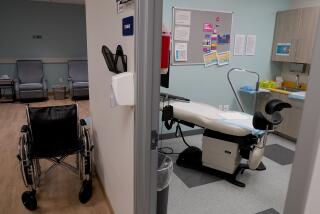Review: ‘After Tiller’ tells personal stories behind abortion
Targeted by protests and far worse, abortion providers are on the front lines of a clash between entrenched sects. Some, like Wichita, Kan., doctor George Tiller, have been assassinated in the name of saving babies. Threats and harassment come with the territory for the remaining few who openly carry on his work, administering legal but increasingly contentious third-trimester abortions. They number four in the United States, and they’re the subject of the revelatory documentary “After Tiller.”
Filmmakers Martha Shane and Lana Wilson, whose profiles in courage are sympathetic but not adulatory, have crafted an absorbing, thoughtful report. Opening their clinics and their hearts to the cameras, the four doctors convey an unbending commitment to helping women in desperate situations. Beyond their compassion is a complex consideration of each patient’s situation. That complexity makes the documentary especially compelling.
The doctors, two men and two women, bring backgrounds as diverse as midwifery and the military to their profession. Filmed at their facilities in Colorado, New Mexico and Nebraska (until that state’s precedent-setting “fetal pain” law forces one physician to relocate), they counsel patients and listen to heart-rending stories. There are fetal abnormalities, detected late in pregnancy; emotional and economic factors weigh heavy too. The patients’ faces are unseen. What’s clear, though, is the very personal and difficult nature of their situations.
“After Tiller” is not likely to change minds. But given that the question is usually considered from immovable perspectives — either reproductive rights are under siege or we’re facing an Armageddon against the unborn — the film is a welcome exploration of practical and philosophical matters seldom broached across the partisan divide.
-------------------
“After Tiller”
MPAA Rating: PG-13 for mature thematic material involving abortion, and brief strong language.
Running time: 1 hour, 28 minutes.
Playing: At Landmark’s Nuart Theatre, West Los Angeles.
More to Read
Only good movies
Get the Indie Focus newsletter, Mark Olsen's weekly guide to the world of cinema.
You may occasionally receive promotional content from the Los Angeles Times.






